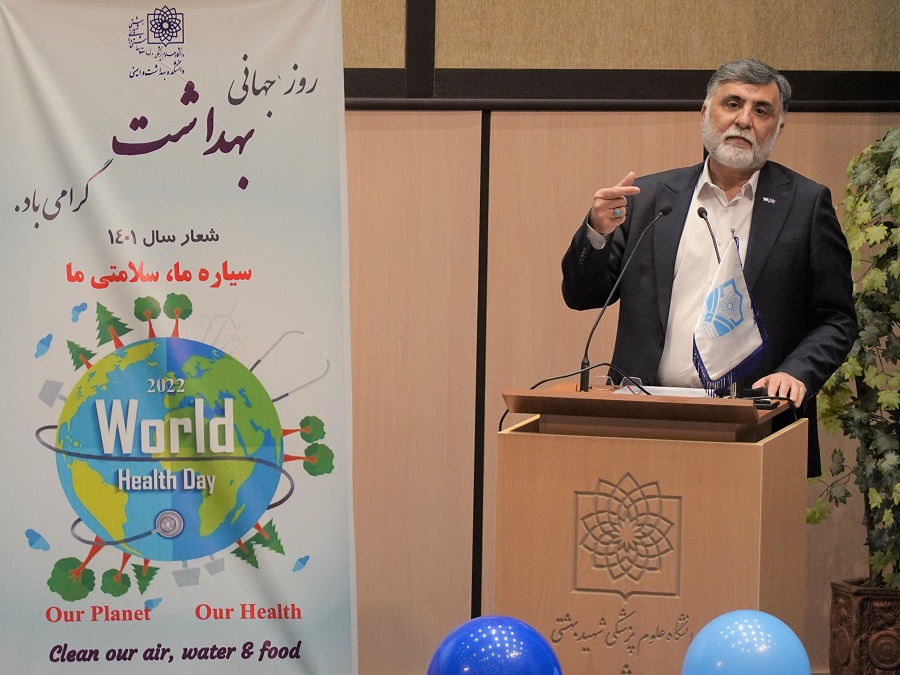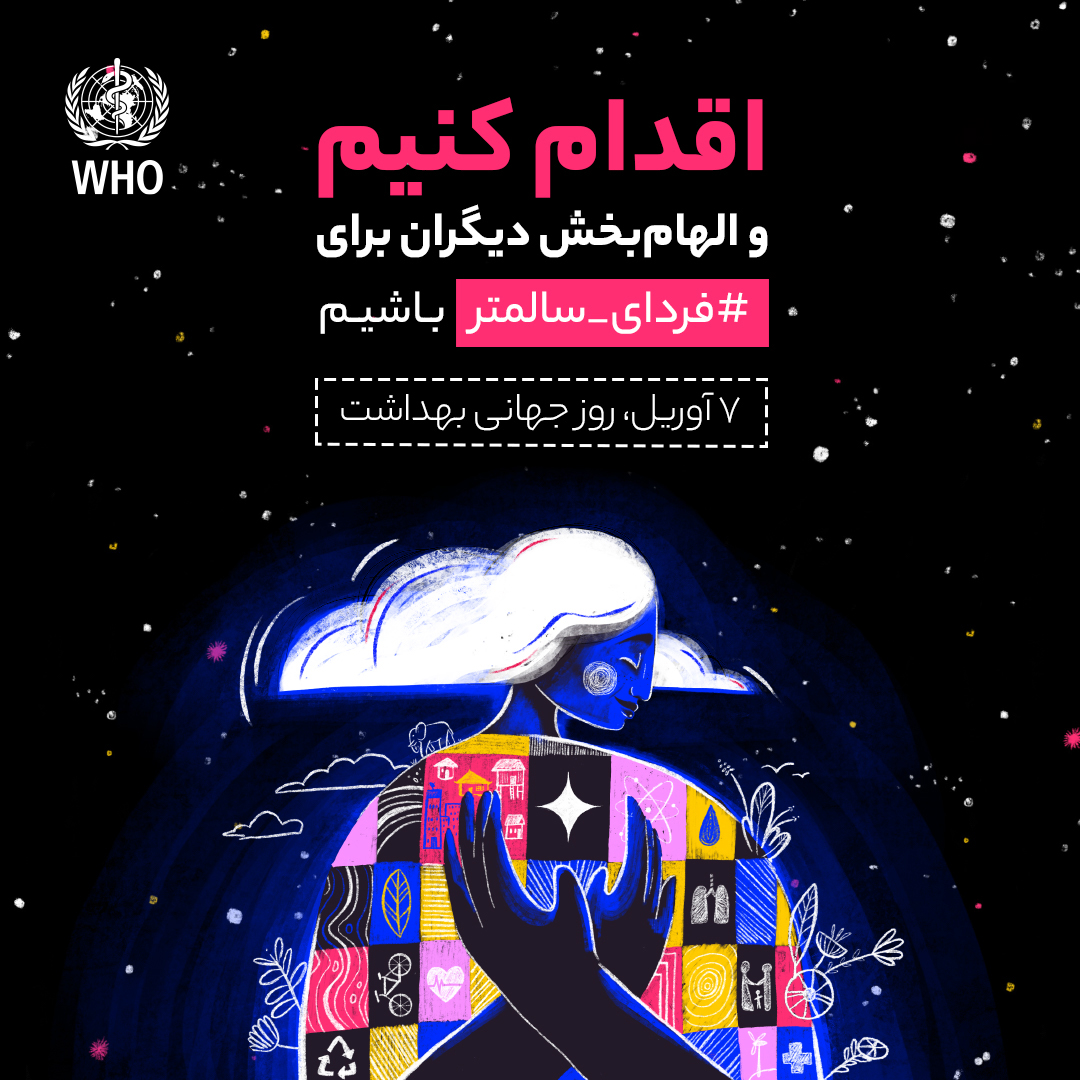Our Planet, Our Health: Act Now for Healthier Tomorrow
 WHO Representative Dr Syed Jaffar Hussain speaks during the commemorative World Health Day event, held on 10 April at Tehran’s Shahid Beheshti University of Medical Sciences. Credit: WHO/Islamic Republic of Iran
WHO Representative Dr Syed Jaffar Hussain speaks during the commemorative World Health Day event, held on 10 April at Tehran’s Shahid Beheshti University of Medical Sciences. Credit: WHO/Islamic Republic of Iran
Sunday, 10 April 2022 – World Health Day 2022 was commemorated by the World Health Organization in the Islamic Republic of Iran in partnership with the Ministry of Health and Medical Education during a formal event organized on Sunday, 10 April by Shahid Beheshti University of Medical Sciences in Tehran.
The event welcomed students in different fields of health and medicine at the university, as well as experts and specialists from a myriad of backgrounds and provided a platform for keynote speeches by WHO Representative and Head of Mission in Islamic Republic of Iran Dr Syed Jaffar Hussain, University Chancellor Dr Alireza Zali, and Deputy Minister for Public Health Dr Kamal Heidari.
World Health Day is seen each year as an opportunity by governments and organizations to draw worldwide attention to a subject of major importance to global health. The joint commemoration of the global occasion, held to mark WHO's founding, will continue through a number of initiatives and events that officially commence on 7 April and run until the end of the month.
“We need to operationalize the Health-in-All-Policies approach, strengthen partnership of health and non-health sectors and focus on political, economic and social drivers and their impact on health and well-being,” said Dr Hussain. “Our vision in the Region is health for all by all and this is not achievable without the intersectoral collaboration of all sectors.”
Under the theme ‘Our Planet, Our Health’ for this year’s World Health Day, WHO is focusing global attention on urgent actions needed to keep humans and the planet healthy and foster a movement to create societies focused on well-being in the midst of a pandemic, a polluted planet, increasing diseases like cancer, asthma, and heart disease.
WHO estimates that more than 13 million deaths around the world each year are due to avoidable environmental causes, which including climate change are responsible for 23% of the total burden of disease in the Eastern Mediterranean Region and as much as 30% of the disease burden for children. An estimated 1 million people die prematurely every year in our Region as a result of living and working in unhealthy environments.
“Countries can achieve health equity by changing policies to give everyone equal opportunity for being healthy, empowerment and engagement of communities, vulnerable and marginalized and affected populations in decision-making and implementation of solutions to ensure timeliness and reliability of data to identify inequalities and evidence-based policy- and decision-making, having an inclusive vision and acting beyond borders,” Dr Hussain underlined.
Throughout National Health Week (24–31 April), WHO will support the Ministry of Health and Medical Education in organizing coordinated meetings between United Nations agencies to discuss and consolidate ongoing efforts for climate and health, health promotion events on the sidelines, and encourage other plans and pledges by government and nongovernmental organizations across the country to prompt political commitment for action and community engagement for impact.
WHO Regional Director for the Eastern Mediterranean Dr Ahmed Al-Mandhari has in turn stressed the critical need to tackle these challenges, by addressing the root causes of ill health. “Many aspects of environmental health go far beyond the health sector, so concerted action by many different actors across different sectors is required, focusing on upstream interventions to prevent, minimize or mitigate environmental risks,” he said in his message on the occasion.
Our political, social, and commercial decisions are driving the climate and health crisis. Environmental hazards such as polluted air, toxic chemicals, and lack of access to water and sanitation exacerbate the Region’s inherent vulnerability to infectious disease outbreaks, epidemics and pandemics, including the ongoing COVID-19 pandemic. There is growing evidence of a direct connection between environmental change and the emergence or transmission of COVID-19, while on the other hand the pandemic has diverted resources from development efforts and placed additional stresses on ecosystems and health systems.

Through the ‘Our Planet, Our Health’ campaign, WHO urges governments and the public to share stories of steps they are taking to protect the planet and their health and prioritize the well-being of individuals for healthier societies. Recovery from COVID-19 also presents a historic opportunity to rebuild better and create cleaner, healthier and fairer systems and societies. Tackling environmental risks is also an essential part of WHO’s vision of Health for All by All in the Eastern Mediterranean Region.
On this World Health Day, WHO calls on everyone – governments, businesses, health professionals, civil society, communities, and individuals – to protect Our Planet and Our Health.
We must act now for a #Healthier_Future.
World Health Day 2022 campaign ‘Our Planet, Our Health’ is being run in Islamic Republic of Iran in collaboration with the Ministry of Health and Medical Education and its affiliate organizations across the country. To see campaign content in Farsi and get more information please visit Instagram page








